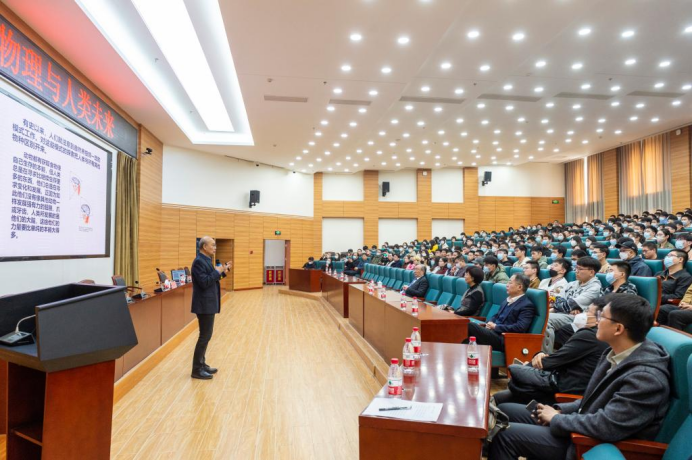Professor Wang Enge Delivered a Lecture in HBU
On the afternoon of March 23, the famous physicist Wang Enge, who is also the academician of Chinese Academy of Sciences, the academician of The World Academy of Sciences for the advancement of science in developing countries (TWAS), the chair professor of Peking University and director of the Institute of Physics of the Chinese Academy of Sciences, was invited to deliver an excellent report titled Physics and Human Future for the faculty and students of HBU. The principal, academician Kang Le chaired this report meeting. Over 400 teachers and students from College of Physics Science and Technology and other schools of HBU were present to hear the report.
Physics is formed through human’s exploration of the mysteries of nature. In the great world of universe and the little world of quark, in the fast attosecond and the slow one giga year, physics unveiled the constitution of substance and the basic laws of their motion at various levels of space and time. In the report, academician Wang Enge used simple and captivating expressions to share the establishment and development of classic physics with everyone present, arousing the keen interests of students in attendance. Furthermore, he described how modern physics got rid of the thought of classic physics which laid the foundation for the consequent scientific and technological innovation and will have a lasting and profound effect on human future.
Through the interaction, Wang Enge had sincere communication involving various aspects with teachers and students in attendance and used plain but significant expressions to encourage them to conduct research in a scrupulous way, to explore bravely and to devote themselves to innovation.
The teachers and students in attendance expressed that the catching words, scrupulous attitude to science, accessibility and the insightful thoughts on physics of Academician Wang Enge impressed them a lot. During the report, the whole audience broke into rounds of thunderous applause.

Professor Wang Enge in the lecture